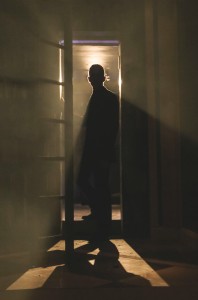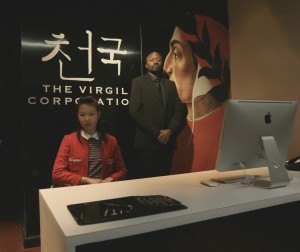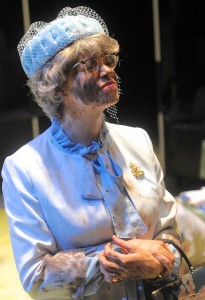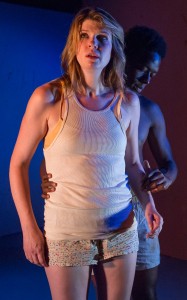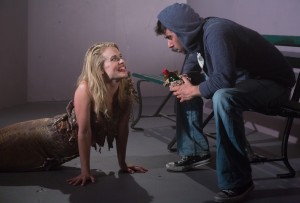Shayok Misha Chowdhury's semi-autobiographical Public Obscenities returns to the stage this season at Theatre for a New Audience as part of The Under the Radar Festival. The production explores themes of returning home and complex relationships as a queer Indian man tries to come to terms with his family’s secrets while breaking away from learned behavior.
Export Quality
Export Quality, a play centered on the mail-order bride system in the Philippines—a practice that usually leads to the trafficking, rape, abuse and death of many women by American men. Although the mail-order bride industry has existed for decades, Export Quality is a reminder to the public that this issue persists. The four main characters who introduce themselves at the outset are commodified and stripped of their fundamental human rights—sentenced to a life of indentured servitude.
Cullud Wattah
Water is an essential part of life. It helps maintain bodily function and provides nutrients and sustenance for plants and animals. It seems unfathomable that life can exist without water, yet that is the reality for the citizens of Flint, Mich. Erika Dickerson-Despenza’s new play, Cullud Wattah, addresses the pollution of the city’s water system and how it has affected the citizens. Cullud Wattah also focuses on the disparity and inequities that prevail in cities with a majority population of minorities.
Sister Calling My Name
Buzz McLaughlin’s 1996 play, Sister Calling My Name, tells a familial story of loss, love and forgiveness. At the center is Michael (John Marshall) an English literature professor whose life has not gone according to his expectations. He has recently undergone a divorce and been denied tenure, and the last thing he wants to do is visit his mentally disabled sister Lindsey (Gillian Todd), who made his life extremely difficult growing up.
Posting Letters to the Moon
Posting Letters to The Moon brings a heartfelt performance to the Brits Off Broadway festival at 59E59 Theaters. Compiled by Lucy Fleming, the daughter of British actress Celia Johnson and an actress herself, Posting Letters to The Moon is a reading of letters between her parents during World War II. Johnson, best known for the 1945 David Lean film Brief Encounter, for which she was nominated for an Oscar, was married to Peter Fleming, an accomplished writer and explorer; he was also the brother of Ian Fleming, the creator of James Bond. Lucy Fleming and her husband, Simon Williams, an actor best known as Mr. Bellamy in Upstairs, Downstairs, read the parts of her parents.
In a Word
Words are constantly shifting and changing meaning, and common phrases take on new personas in the world of Lauren Yee’s In a Word. Yee’s play tells the story of Fiona (Laura Ramadei), whose 7-year-old, emotionally disturbed son, Tristan, has been missing for two years. She has no information on his whereabouts, and she sorts through her memories endlessly to find any clue she can about why he disappeared. As Fiona flashes back to past experiences, Yee asks the audience to let go and come along for the ride.
This Day Forward
This Day Forward continues playwright Nicky Silver’s meditation on parent-child relationships that he made a success of with The Lyons. His caustic new play focuses on the damage that parents can inflict on children—it’s a broad canvas of emotional (and sometimes physical) abuse, distilled into two acts set a generation apart.
My Name Is Gideon: I’m Probably Going to Die, Eventually
Every now and then a theatrical experience comes around that breaks the mold. It’s no simple task to categorize Gideon Irving’s performance piece running at the Rattlestick Playwrights Theater. Part musical, part stand-up comedy, (very small) part magic act, and part intriguing night in a complete stranger’s living room, My Name Is Gideon: I’m Probably Going to Die, Eventually is far from a one-trick pony. On the contrary, the hour-and-45-minute show is constantly surprising audience members with laughs, gasps, songs and even snacks!
A Classic Comedy Conquest
Playwright Oliver Goldsmith found fame with his play She Stoops to Conquer in 1773, despite his rather unfashionable social reputation among London’s upper crust. Indeed, Goldsmith made it his life’s work to go against the grain, and She Stoops to Conquer exemplifies his disdain for Sentimental Comedy—a genre that was en vogue in the first part of the 18th century. Those saccharine works featured one-dimensional characters whose apotheosis was meant to instill what Sentimental playwright Richard Steele haughtily deemed “a joy too exquisite for laughter.”

Goldsmith, on the other hand, was a champion of hearty laughter, which this play—when produced well—can stir up in droves. Compared to Sentimental characters, Goldsmith’s characters are imperfect, and therein likable. The Actors Company Theatre (TACT) is staging a slightly imperfect (and therein quite likable) production of Goldsmith’s important play, directed and adapted by Scott Alan Evans. The moments when this production shines most are when it is faithful to Goldsmith’s unique genre of “laughing comedy,” aimed to elicit belly laughs with physical ridiculousness and silly twists of plot.
She Stoops to Conquer presents a bouquet of delightful characters—two eligible ingénues, a couple of bachelors from the city, and a pair of meddling parents—all of whom are subject to the playful deceits of the puckish Tony Lumpkin (Richard Thieriot). The action takes place at Mr. and Mrs. Hardcastle’s estate in the English countryside. Their daughter Kate (Mairin Lee) and their ward, Constance Neville (Justine Salata), are excited to receive two handsome young suitors (Charles Marlow and George Hastings, played by Jeremy Beck and Tony Roach) at the estate that evening.
Tony, who also happens to be Kate’s illegitimate brother, foils the plan when he intercepts the suitors at the village pub. Wanting to free himself of his mutually undesired betrothal to Constance, Tony concocts some of his signature meddling. Bringing the suitors to the estate, Tony leads them to believe that they are staying a night at an inn—and that the elder Hardcastles are actually innkeepers. This creates room for Kate, disguised as a barmaid, to woo the painfully shy Marlow, and for her cousin Constance to pursue her true love Hastings.
Overall, the cast seems to enjoy themselves in this genre. Thieriot as Tony absolutely sparkles with his mix of conniving wit and lowbrow buffoonery. As his bumbling parents, Cynthia Darlow and John Rothman are adorably befuddled by their son’s antics. Things really get good after intermission, in which Tony sends his enraged mother and Constance on a 40-mile carriage ride to nowhere, and Mr. Hardcastle finally snaps after being treated like the help in his own home. The two sets of young lovers deserve even more spice, however, especially in light of their comic counterparts; perhaps that could be created with more emphasis on physical humor rather than delivery of language.
One distinct aspect of this production is its intermittent puncturing of the fourth wall. Evans’s direction leans heavily on this device, employing a considerable amount of direct audience interaction and unmasking of the usual theatrical dressings. For example, there is no backdrop to hide the actors as they await their entrances. Instead, they are visibly seated in two rows of chairs on either side of the stage, which is a raised platform. Admittedly, Goldsmith's original script contains plenty of asides—monologues that characters deliver directly to the audience—but by stripping the stage bare, Evans’s adaptation carries the meta-theater several steps further. The bits of audience interaction between scenes undermine the actors’ comic choices and interrupt the flow and style of the play. All in all, however, this nontraditional choice does not sink the production, which provides both a fun night at the theater as well as an opportunity to experience one of England’s most important and beloved plays.
TACT’s She Stoops to Conquer plays at the Clurman Theatre at Theatre Row (410 West 42nd Street between Ninth and Tenth avenues) until Nov. 5. Tickets are available online here or by calling the TACT Member Hotline at (212) 560-2184 or (212) 947-8844.
A Paradise for Paranoia
You are locked inside the small lobby of a corporate office building with 10 other strangers. An ominous voice on an intercom informs your group that you have one hour to escape. The lights go out. A screen flickers on, flashing random surreal images quicker than your brain can process. A human eye; a girl in a forest; a Romantic painting; an architectural spiral. Everyone panics.
This might sound like a nightmare, but it's actually the beginning of Paradiso Chapter 1, a self-described immersive theatrical escape room experience located in Korea Town. Created by theatrical innovator Michael Counts, Paradiso tries to set itself apart from other New York City escape rooms by incorporating several rooms of immersive theater, live actors, and "existential themes." Despite these claims, however, Paradiso does not escape the genre of escape rooms, which is limited by design.
Originating in the early 2000s, escape rooms have gained popularity in many cities across the world, especially in Asia and the U.S. In New York alone, there are dozens of escape rooms to choose from. The concept is simple, but the design can be very complicated: groups of participants are put inside a room or series of rooms and must solve a gauntlet of puzzles within a set time in order to "escape." Many of these rooms have themes. Paradiso Chapter 1 seems to evoke corporate corruption similar to dystopian film and TV shows like Mr. Robot or V for Vendetta, with scattered references to Dante's Divine Comedy.
The Paradiso experience begins days in advance with a series of cryptic text instructions sent to your personal cell phone. A few hours before, you are instructed to meet at an obscure karaoke bar in K-Town. While this messaging system seemed to work for some participants, for one technical reason or another, several others did not receive correspondence. A set of email instructions advice participants to surrender all of their belongings to storage before the experience, but no such check was mandated (only offered to participants who wanted to shed their bags). This meant that, for better or for worse, our group relied on our cell phones throughout the experience—for illumination, notes, or recording clues or images.
During the experience, actors appear to help or hinder your quest to escape. Sarah Jun, Claire Sanderson, Joe Laureiro, and Brian Alford all manage to develop interesting characters within the confines of the escape room format. It is unclear exactly what is at stake, but it seems as if Virgil Corporation is trying to cover up some secrets hidden within their commercial empire. It is left ambiguous whether any of the characters are sympathetic to Virgil Corporation, or whether they are sincerely trying to help you escape. With such a talented cast at hand, Paradiso might consider developing a clearer storyline and incorporating each actor further into the fabric of the experience, perhaps to develop a storyline and to offer insight into the show's supposed existential themes. Instead, the actors felt more like fancy props, limited to (with the exception of Jun) garbled utterances about clues.
Escape rooms, by nature, are different every time. One may or may not escape, depending on the speed at which their group finds and interprets clues correctly. Paradiso claims to incorporate immersive theater techniques, but do not expect the same level of detail as the exquisitely designed sets of companies like Punchdrunk or Third Rail. These immersive companies take precise care to make sure that every object within the interactive set tells a story. The objects in Paradiso seem more haphazard. Additionally, many immersive theater productions, such as Tony & Tina's Wedding, allow participants to talk to the characters and piece together a narrative through their interactions. However, do not expect to interact meaningfully with the characters as one might in local immersive productions such as Speakeasy Dollhouse or The Grand Paradise Hotel.
Escape rooms are not for everyone, but if you enjoy high-pressure gaming environments, definitely attend Paradiso: Chapter 1. Be aware that the pace is fast, the energy is high, and the rooms can become very hot. If immersive and interactive theater is more your thing, consider skipping this one. Our group was unsuccessful in escaping, and Alford's character booted us to the curb as quickly as Jun's had swept us in. Despite failing, it was a unique experience, and will definitely get your adrenaline going.
The open-ended run of Paradiso: Chapter 1 plays Wednesday–Friday from 6–9:30 p.m., Saturday from 2–9.30 p.m., and Sunday from 2–8:30 p.m., with audiences entering every half hour. Paradiso: Chapter 1 takes place at a secret location in Korea Town that is not unveiled until audiences arrive at a designated meeting point shared when their tickets are booked. Tickets start at $45 and are available via www.paradisoescape.com. Advance booking is required.
A Heartsong for Hades
Anaïs Mitchell’s Hadestown, a concept album turned folk opera, adapts the myth of Orpheus by infusing it with American folk and New Orleans jazz music. Now playing at New York Theatre Workshop, Hadestown follows Orpheus (Damon Daunno) to hell and back again in pursuit of his young lover, Eurydice (Nabiyah Be), who has been lured there by the lord of the underworld, Hades (Patrick Page). Being a “folk opera,” the production is almost entirely sung-through, and Rachel Chavkin’s direction carries one song fluidly into the next. Like its classical source, Hadestown is alternatively gorgeous and dark, and the heartfelt commitment of the cast and musical ensemble brings the myth’s paradoxically sad beauty into full bloom.
As an energetic balance of hope and sadness, Hadestown finds light in the darkness and vice versa. The production’s casting reflects this balance: the naiveté of Be’s Eurydice and Daunno’s Orpheus contrasts starkly with the underworldly knowingness of Amber Gray’s Persephone and Chris Sullivan’s Hermes. Sullivan’s portrayal of his character is particularly complicated, as an enlisted messenger for the underworld with a soft heart for the young lovers. The Fates (played by Jessie Shelton, Shaina Taub, and Lulu Fall) are similarly uncommitted in their alliances, singing at times of great love and at others of shattering despair. As the brooding, unrelenting Hades, Page’s reverberating bass vocals figuratively open the doors of hell itself. In voice and movement, this hugely talented ensemble strikes near-perfect harmony in Act I. Act II contains major strengths, including some of the show’s most tear-jerking moments, but overall it lacks the simpatico energy of Act I.
Based on Mitchell’s celebrated folk album, music is the absolute center of Hadestown. Indeed, at times this music-forward production feels more like a highly-produced concert than a play—which works well with such a polished songbook. Michael Chorney and Todd Sickafoose’s co-arrangements and Liam Robinson’s musical direction sonically transform the space into a concert-in-the-round, immersing audiences with powerful voices and instrumentals.
Chavkin puts the space, reconfigured to stadium seating, to great use with entrances and exits from all angles and levels. Visually, Bradley King’s lighting synergizes with the music, especially in Act I’s penultimate “Wait for Me.” In this number, the Fates swing hanging wire lamps to and fro, visually embodying the show’s undulating emotional landscape between hope and uncertainty.
Adapting ancient Greek myths is nothing new for off-Broadway directors, but Mitchell and Chavkin’s Hadestown feels particularly fresh right now. In the “Wedding Song” Eurydice asks her new lover Orpheus how their young, penniless relationship will ever survive with “times being what they are—dark and getting darker all the time.” Eurydice’s ambiguity resonates in a time when the American middle class is dwindling and senseless acts of violence continue to erupt here and abroad. Later in Act I, Hades delivers a timely diatribe in the song “Why We Build the Wall,” echoing the latent xenophobia drummed up by the current election campaign’s fear-based politicking.
At the same time, amid this darkness, the pure love between Eurydice and Orpheus shines through—even Hades and Persephone's fraught relationship contains a hidden softness. Indeed, the sweet vulnerabilities embedded in the music and performances of Hadestown convey the very joys and hardships that make being human so painfully beautiful.
Hadestown runs through July 31 at New York Theatre Workshop (79 E. 4th Street between Bowery and 2nd Avenue.) No late seating. Tickets are available here or by calling 212-460-5475.
Truths Be Told
The British have a way of turning the everyday inside out in a humorous way. Confusions, written and directed by Alan Ayckbourn, and part of the Brits Off Broadway festival, is a masterly series of vignettes in which characters try hard to maintain normalcy and decorum, but when a single truth is revealed through an ill-timed but dramatically funny mishap, a more personal and meaningful internal world is uncovered. The cast of five—Elizabeth Hoag, Charlotte Harwood, Stephen Billington, Richard Stacey and Russell Dixon—skillfully play a handful of characters.
In “Mother Figure,” Lucy (Elizabeth Hoag) is a harried and all-consumed mother who doesn’t pay much attention to the ring of the phone, the doorbell, and thus the outside world. When her neighbors, Terry (Stephen Billington) and Rosemary (Charlotte Harwood), stop by to check on her for her husband who is away, she can’t seem to carry on a simple conversation. Instead, she offers juice to Rosemary and milk to Terry, to which he defiantly claims he “hates the damned stuff.” She counters: “I’m not going to waste my breath arguing with you, Terry. It’s entirely up to you if you don’t want to be big and strong.” Terry doesn’t have a clue how to respond. When Terry drinks all of Rosemary’s juice and then insults her, the moment uncovers some bigger marital problems. Lucy, undaunted, doesn’t believe anything can’t be solved with simple directives, and orders Terry to say he’s sorry to Rosemary. Reduced by her stern mother figure, they kiss her good-night before they leave, and when she tells them to hold hands while crossing the street, they oblige, and one feels all has been restored.
“Drinking Companion” shows Lucy’s husband, Harry (Richard Stacey), a traveling salesman who feels his wife is happier when he’s away. Desperate to connect with another adult, particularly a woman, he makes a show of being friendly with Paula (Charlotte Harwood) at the hotel bar. He struggles to pump himself up when he talks about his line of haute couture and colors, but all he really wants is companionship. As he grows drunker he tries not to make advances, but puts his key on the table, and says, “I’m going to leave it there. I’m not going to try and embarrass you, you see, but its there. If you want to pick it up, it’s there. Entirely up to you.” When he goes out to call a cab, Paula and her friend slip away. Poor Harry.
Ayckbourn also captures how communication is about energy and not necessarily words. In “Between Mouthfuls” two separate couples dine at a restaurant under the pretense of having a pleasant evening out. However, their conversations soon turn to jealousies. As things intensify, they continue their argument even when the sounds of their voices drop away. Their jaws, working out the tension around the words, still speak volumes.
Sometimes a small reveal can have big consequences. This is especially true in “Gosforth’s Fete” in which Milly (Charlotte Harwood) is setting up for tea in a tent to celebrate the visit of an important patron. There are many problems that day, including a mute loudspeaker. Gosforth, the organizer of the event and local pub owner, tinkers with the loudspeaker during a conversation with Milly. Unbeknownst to them, he gets it to work at the same time that Milly reveals her news. It’s a cringeworthy yet funny moment because it’s the kind of timing you know can happen but wish it wouldn’t. Milly’s fiancé Martin (Stephen Billington), a Boy Scout leader, is so overwrought from the inadvertent revelation he gets drunk on sherry. In the end, Milly sizes him up and declares that she doesn’t like his baggy shorts anymore, anyway.
Capping the evening, “A Talk in the Park” brings the ensemble together. Each character wants to enjoy the park alone for various, personal reasons. With only four park benches and five characters, one is bound to join another. In a round robin of sorts, one sits next to another, thus intruding on their solitude. However, as much as these people want to be left alone, they don’t hesitate to complain about the person who was “talking too much” to the occupant on the next bench when they move. It turns out they can’t help talking too much as well, and thus the initial occupant moves to the next bench. And so the circle continues. The scene captures both the inside and outside aspect of our desires to be alone, yet at the same time to share and unburden the troubles we carry in our hearts and minds.
Confusions by Alan Ayckbourn is part of the Brits Off Broadway festival and is playing through July 3 in repertory with Hero's Welcome at 59E59 Theaters (59 East 59th St. in Manhattan). Tickets are $70 and may be purchased by calling Ticket Central at (212) 279-4200 or visiting www.59e59.org, where the repertory schedule may also be seen.
Crossing Into Madness
The filth, danger and enchantment of the South comes alive in Adam Rapp’s Wolf in the River and it all takes place around a fresh mound of earth with intoxicating purple flowers. The Man (Jack Ellis) is a shapechanger and he stands barefoot in the dirt, like he is on a soapbox, and counts each audience member one at a time. He is shirtless and holds his torso firmly as he moves around the room demonstrating his dominance. The shapechanger can supernaturally change from a man, to a wolf, and to a nasty, old woman named Dumptruck Lorna. The Wolf smells a pair of used panties from a canvas sack and examines a muddy sundress, cutoff jean shorts, sneakers and a cell phone. Ghoulish men and women known as the Lost Choir creep around the space and hide in the shadows. Suddenly, a distraught, young woman, Tana Weed (Kate Thulin), runs onto the stage naked, grabs the items and is attacked by the Wolf and Lost Choir.
The production explores Tana’s relationship with her apparent first love, Debo (Maki Borden)—a jovial young man from Benton, Illinois. Lighting designer Masha Tsimring uses the warm light from a worn fridge skillfully to create intimacy as Tana and Debo talk to each other over the phone. Scenic designer Arnulfo Maldonado constructs a psychotic background with black stick figures drawn across plywood walls and a thick rope looming over the stage. On a back wall hangs a picture of Jesus Christ with a green, plastic Christmas garland and red bow.
Tana also experiences a contrasting world of chaos and violence that is ran by Monty Mae Maloney (Xanthe Paige). Monty is a blood collector and uses a cane with an alligator head on top of it even though she walks perfectly well. She is also the girlfriend of Tana’s older brother, Dothan (William Apps). Dothan is a dishonorably discharged veteran who spends his time silently tinkering with electronic gadgets. Monty’s gang consists of Aikin (Karen Eilbacher) and Ansel Pinwood (Mike Swift), who goes by Pin. Aikin appears to be a masculine lesbian and eats the purple flowers to get high. Pin runs onto the stage half-naked with a printed copy of Miley Cyrus’ face taped to a blow-up doll. He has sex with the doll over the mound of dirt. Monty ensures that her crew have their intravenous medical ports working properly so that she can draw blood from them.
Theatergoers experience Tana’s worlds as though they are sitting right next to her, and this intimacy is the real value of this production. When Monty slams Tana’s head into the fridge, audience members might even get fake blood splattered on their clothes. The fresh soil from the center mound of earth and burning incense also brings a sense of smell to these worlds. Tana’s life is exposed, criticized and objectified. Nothing, including Tana’s virginity, is not left unjudged. Under Rapp’s direction, The Flea Theater’s resident volunteer acting company, The Bats, have these worlds come alive in raw form.
Rapp and the cast make bold choices and commit to them, but the challenge is having these choices payoff with theatergoers. The vulgarity in some of the scenes can create distance for theatergoers who are trying to relate to the characters and understand the storyline. It is awkward watching the Wolf engage with audience members when the audience is still just trying to figure out what is going on. The overall aim and vision can be unclear and other markets may not respond to this material.
At the same time there is so much depth to these characters that each of them could have their own play written about them. The issues are rooted more so in the characters and not the plot. Each character’s stand is like figments of Tana’s imagination. The violence, nudity and sexual situations do effectively show the characters’ vulnerability, desperation and fears–even when theatergoers have already seen enough.
Wolf in the River is recommended for theatergoers who want to be challenged and still have the patience to see what this production has to offer at the end. It is not recommended for those seeking a nicely woven and easy-to-swallow story. Thulin’s performance as Tana is solid and her ability to stay in character and be innocent while going through hell is very impressive. Tana’s hunched shoulders and bloody nose suggests that she is timid and defeated, but her determination to leave her hometown and run away with Debo stays present in her eyes. She is not a victim, but a survivor who hides her reality from Debo. The audience is the river and the Wolf says, “You go for miles and your current’s so strong this time a year that the people in this town string ropes across to help folks get to the other side.”
Wolf in the River runs until June 6 at The Flea Theater (41 White St. between Church Street and Broadway) in Manhattan. Evening performances are Monday and Thursday-Saturday at 7 p.m. and select matinee performances are Saturday at 1 p.m. and Sunday at 3 p.m. Tickets range from $20-$100. To purchase tickets, call 212-352-3101 or visit TheFlea.org.
A Slanted Perspective
The reality in New York City and the rest of the modern world can seem absurd, morbid and mysterious from one minute to the next. Troy Deutsch’s In a Tilted Place shows just how strange life can really get. The production is a series of nine outlandish short plays, or wild scenes, and opens with a giddy, young woman (Cassandra Stokes-Wylie) retelling her “very, very real” dream. In her dream, she saw herself as a spirited girl, who had faith in God and ate ice cream at her local Dairy Queen. In her small town she “[biked] down Main Street with streamers on [her] handlebars.” Her story starts to take an unexpected turn when she shares about her first love, an “All-American quarterback.” She had group sex with her football player boyfriend and a brown, squirrel mascot who had “actual squirrel fur,” small paws and human eyes.
These creepy twists and turns are consistent throughout In a Tilted Place, and theatergoers wonder what this show is trying to say about the world we live in. The characters are in environments that seem normal at first and then their circumstances become bizarre and surreal. The female characters are often portrayed as controlling, manipulative, sex-crazed maniacs and the men are aloof, unavailable, drunk or driven mad by women. The value of this production is its ability to present ordinary, day-to-day life as uncanny, odd and whimsical. In a Titled Place is able to disgust, enlighten and provoke audience members.
In the second play, Chanel Chance, a lonely, desperate, young woman Ella (Kelsie Jepsen) sits in a cafe and tries to read Donna Tartt’s Pulitzer Prize-winning novel, “The Goldfinch.” Ella catches the gaze of a young man (Ronald Peet) sitting at another table and asks, “Are you someone? I’m sorry. But I noticed… Are you watching me? I’ve been looking over here and…” Their quirky exchange quickly becomes heated and even more awkward when Ella discovers that her own father has been paying this young man to spy on her. Ella forcefully kisses the man and demands, “Just look at me. Just smell me. Smell me. Smell my neck. Smell it. Smell it.” It is like watching a weirder version of an episode from “The Twilight Zone.”
This is Peet’s opening scene and his heavenly voice is abruptly overshadowed by Jepsen’s frenzied performance as she dominates the space. Peet is an exceptional actor from the Bahamas who graduated from the Tisch School of the Arts Drama program at New York University. Directors Ashley Brooke Monroe and Courtney Ulrich could balance out this scene by having Peet speak directly to the audience more often and have Jepsen slow down a bit. In a later play, Glowing Dinoflagellates, Peet plays naive and impressionable Benjamin. Benjamin is seduced by a powerful, horny, middle-aged woman (Pamela Shaw) to stay at her vacant inn on a cliff. Peet and Shaw’s authentic chemistry and first-rate performances complement each other extremely well and create a solid foundation for other actors to shine. Sex slaves (Sean Kazarian and Michael Kingsbaker) generously contribute to heightening this scene by bringing comic relief as they ramble on in unison about their torturous stay at the inn.
This production’s material is too insular and will likely not travel beyond audiences who enjoy fringe theater. In Brown Fish, a young woman sits on a bench in a concrete park and confesses to her male friend about her roommate’s poop cabin. She describes the poop cabin as “A brown, self-induced, feces log cabin. Like from pioneer days. But the logs, instead of wood, were made of poop.” Wider audiences may not appreciate this production’s unconventional subject matter and style.
The set design by Kate Noll is uncomplicated with a few pieces of furniture and gray, bland walls that look like concrete. Viewers get the sense that these characters exist between a rock and a hard spot. It is like watching a group of people living in an emergency exit hallway in the basement of a skyscraper, and they do not know that the building is on fire. This minimalistic approach is not distracting and allows for audiences to focus solely on the performances. The simplicity works when a mermaid (Rachel Moulton) slowly drags herself across the floor and onto the stage in Call Me Daryl Hannah. Audiences are captivated watching her struggle as she pulls her body and huge fin across the bare, hard surfaces to meet a young, drunk man (Kingsbaker) sitting on a park bench.
In a Tilted Place relies on shocking and unusual subject matter to create tension and mystery. Audience members can turn into distant bystanders who are merely observing. As observers, they can become disconnected from these unique characters and not know how to relate. A clearer overall aim and vision could create a deeper appreciation for this production’s willingness to transcend traditional ideas.
In a Tilted Place runs until Aug. 30 at the IRT Theater (third floor of 154 Christopher St. between Washington and Greenwich Sts. in Manhattan). Evening performances are Monday, Friday and Saturday at 8 p.m. and matinee performances are Sunday at 3 p.m. Tickets are $18 and can be purchased by calling 800-838-3006 or visiting BrownPaperTickets.com.
Shut Up, Sit Down, and Enjoy!
A mix between stand-up comedy show and play (it’s billed as a “plomedy”), Shut Up, Sit Down and Eat has charm, wit, laugh-out-loud humor, and a few touching, “aw”-worthy moments as well.
Four Italian Americans—three men and a woman—sit in a waiting room for a group therapy session. The only problem is, it becomes clear the shrink isn’t showing up. Instead, these four strangers trade memories and stories in their own hysterical form of therapy.
The comedy is based on a shared Italian-American experience. The three men continually bless themselves at the mention of Sinatra, bicker over the proper terminology for sauce vs. gravy, and make some off-color jokes about zeppoles. Nonetheless, non-Italians are sure to find the show wholly relatable as well, as it touches on universal themes like family, death, marriage, and sex.
The cast of four features comedians Tina Giorgi, Joe Moffa, Chris Monty, and Eric Tartaglione. These talented individuals, along with Tom Ingegno, also wrote the script. Giorgi, Moffa, Monty, and Tartaglione each bring their own style to the show, and none overshadows the others thanks to skillful directing by Eve Brandstein.
Each actor plays a character with the same name, raising the question of just how much truth lies in these vignettes. Tina Giorgi, the lone female, is fascinated by the psychological terminology in her book. Married to a Southerner, she feels utterly trapped between the two different worlds inhabited by her and her husband’s families. Giorgi delivers the most moving monologue of the production, though she is also capable of deadpanning about sperm and turkey basters at another point in the show.
The divorced Moffa recently lost his job and now must contemplate the ways of hanging himself in a basement apartment with six-foot ceilings (taping his ankles to his ass, naturally). He may be able to joke about it, but it becomes evident that he’s truly hurting—especially because of the strained relationship with his daughter, which he is at a loss to salvage.
Monty still lives at home with his parents and grandmother, but is sick of being treated like a child. He has met a girl he cares about, despite the fact that she’s Polish, so what’s stopping him from moving out and moving on with his life? Perhaps it’s the fact that his grandmother makes him great biscotti.
Tartaglione is perhaps the funniest of the four, conjuring thoughts of Danny DeVito. But, as with the rest of his castmates, Tartaglione has an impressive ability to transition seamlessly from vulgar jokes to heartfelt confessions. He is married to a woman who drives him crazy. But who isn’t driven crazy every now and then by a significant other? What really makes his performance memorable is his love for his adopted daughter, who took his last name and decided to keep it when she got engaged.
The production’s lighting subtly distinguishes the play’s action is it moves from the private thoughts of the characters to a series of individual short monologues that range from tear-jerking to gut-busting.
An intimate space lends itself to this type of show, but the sound of other productions could be heard through the Snapple Theater’s thin walls. It was an unfortunate and sometimes frustrating distraction.
Shut Up, Sit Down and Eat offers more than a few cheap mafia jokes. Audiences catch a glimpse into the relatable lives of four complex individuals—with with a countless number of hopes, fears, dreams, regrets and, most important, jokes.
Performances of Shut Up, Sit Down and Eat are Sundays at 5:15 p.m. through the end of December at the Snappple Theater Center, 1627 Broadway. The run is open-ended; tickets may be purchased here.
















